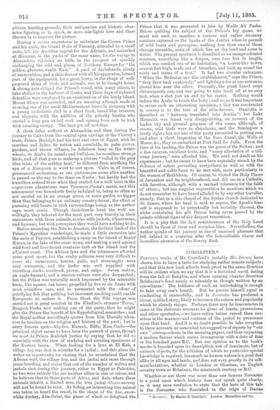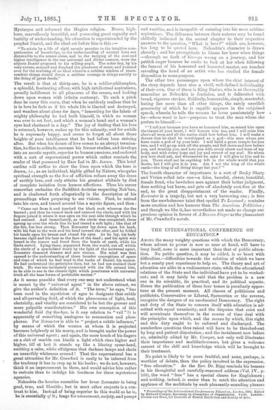Z °ROASTER.* PREVIOUS works of Mr. Crawford's (notably Mr. Isaacs)
have shown him to have a taste for studying rather remote subjects; and that this new book affords fresh proof in the same direction will be evident when we say that it is a historical novel dating from the fall of Babylon, and whose opening chapter describes Belshazzar's feast nearly as minutely as though written by an eye-witness The boldness of such an undertaking is enough to take away one's breath. But he proves himself equal to conducting it successfully, and in Zoroaster has produced a clever, spirited story, likely to increase the esteem and popularity which he already enjoys. Perhaps there may be inaccuracies in some of the elaborate accounts he gives of feasts, processions, and other spectacles,—we leave critics better versed than our- selves in the manners and customs of the period to pronounce upon that head. And it is no doubt possible to take exception to these accounts as somewhat too suggestive of reports by "our own" correspondents in the morning papers, and thus imparting a modern flavour which seems incongruous with a date of four or five hundred years B.C. Bat our opinion as to the book's merits is founded upon its description, not of inanimate, but of animate objects, for the criticism of which no particular special knowledge is required, inasmuch as human nature is a good deal alike in all ages and lands, and does not vary greatly in its self- manifestations, whether in London or Shushan, an English country town or Ecbatana, the nineteenth century or B.C.
Whether or not there was more than one famous Zoroaster is a point upon which history does not speak quite clearly, so it may save confusion to state that the hero of this tale is the Zoroaster who flourished in the reign of Darks
* Zorooster. By Marion F. Crawford. London: Macmillan and Co.
Hystaspes and reformed the Magian religion. Brave, high- born, marvellously beautiful, and possessing great capacity and lucidity of understanding, his education is superintended by the prophet Daniel, and the ideal set before him is this :— "To attain by a life of rigid ascetic practice to the intuitive com- prehension of knowledge, to the understanding of natural laws not discernible to the senses alone, and to the merging of the soul and higher intelligence in the one universal and divine essence' were the objects Daniel proposed to his willing pupil. The noble ivy, by his very nature, scorned and despised the pleasures of sense, and yearned ever for the realising of an ideal wherein a sublime wisdom of trans- eendent things should direct a sublime courage in things earthly to the doing of great deeds."
The result is that at thirty-one, he is a soldier-philosopher, a splendid, fascinating officer, with high intellectual aspirations, proudly indifferent to all pleasures of the senses, and looking down upon women with infinite contempt. To such a pitch does he carry this scorn, that when he suddenly realises that he is in love he feels as if his whole life is blasted and destroyed,
and wanders about alone for days, "lamenting for the fabric of mighty philosophy he had built himself, in which no woman was ever to set foot, and which a woman's hand and a woman's eyes had shattered in a day." The joy of finding that his love is returned, however, makes up for this calamity, and for awhile he is supremely happy, and seems to forget all about those
heights of pure intelligence that he had before been striving after. But when his dream of love comes to an abrupt termina- tion, he flies to solitude, resumes his former studies, and develops into an ascetic mystic, superior to human passions, and endowed with a sort of supernatural power which rather reminds the
reader of that possessed by Ram Lal in Mr. Isaacs. This brief outline will suffice to show the lines upon which the hero is drawn, i.e., as an individual, highly gifted by Nature, who gains
spiritual strength as the fire of affliction refines away the dross of earthly love, and only attains his greatest altitude by dint of complete isolation from human affections. Thus his career somewhat embodies the Buddhist doctrine respecting Neh'ban, and is shadowed forth allegorically in the description of his proceedings when preparing to see visions. First, he retired into his cave, and traced around him a mystic figure, and then :
"Came out from it and touched the black rock whereon the fire burned ; and then he turned back and entered the circle, and with his fingers joined it where it was open on the east side through which he had entered. And immediately, as the circle was completed, there sprung up over the whole line he had traced a soft light ; like that of the fire, but less strong. Then Zoroaster lay down upon his back, with his feet to the west and his head toward the altar, and he folded his hands upon his breast and closed his eyes. As he lay, his body became rigid and his face as the face of the dead ; and his spirit was loosed in the trance and freed from the bonds of earth, while his limbs rested. Lying there, separated from the world, cat off within the circle of a symbolised death by the light of the universal agent, Zoroaster dreamed dreams and saw visions. His mind was first opened to the understanding of those broader conceptions of apace and time of which he had read in the books of Daniel, his master. He had understood the principles then, but he had not realised their truth. He was too intimately connected with the life around him, to be able to see in the clearer light which penetrates with universal truth all the base forms of perishable matter."
As it seems possibl e that every one may not understand what
is meant by the "universal agent" in the above extract, we give the author's definition of it. "The term," he says, "has been used in the mysticism of ages to designate that subtle and all-pervading fluid, of which the phenomena of light, heat,
electricity, and vitality are considered to be but the grosser and more palpable manifestations." His own conception of this wonderful fluid (by-the-bye, is it any relation to " vril " ?) is apparently of something analogous to mesmerism and phos- phorus. For Zoroaster is able to "project a subtle influence," by means of which the woman at whom it is projected becomes helplessly at his mercy, and is brought under the power of this universal agent ; and again, the mere touch of his fingers on a slab of marble can kindle a light which rises higher and higher, till at last it stands up like a blazing spear-head, emitting a calm, white effulgence that darkens lamps and sheds an unearthly whiteness around ! That the supernatural has a great attraction for Mr. Crawford is easily to be inferred from the tendency it has to crop up in his books ; we do not, however, think it an improvement to them, and would advise him rather to restrain than to indulge his fondness for these mysterious agencies.
Nehushta the heroine resembles her lover Zoroaster in being good, true, and likeable ; but in most other respects is a con-
trast to him. Instead of being superior to this world as he is, he is essentially of it ; longs for amusement, society, and pomps
and, vanities, and is incapable of entering into his more sublime aspirations. The difference between their natures may be found skilfully indicated in the second chapter in their respective answers to the question, "What is love P" which are, however, too long to be quoted here. Nehushta's character is drawn cleverly ; and her promptitude to blame her lover when things —through no fault of his—go wrong on a journey, and her pettish anger because be omits to look at her when following the funeral of his honoured and lamented master, are touches revealing the hand of an artist who has studied the female disposition to some purpose.
The other two personages upon whom the chief interest of the story depends have also a vivid, well-defined individuality
of their own. One of these is King Darius, who is as thoroughly masculine as Nehushta is feminine, and is delineated with
broad, vigorous strokes. Soldierly, honourable, simple, masterful, hating lies more than all other things, the rarely unselfish generosity of which he is capable appears in the subjoined speech, wherein he tells the woman he loves passionately how • he—whose word is law—purposes to treat the man whom she prefers to himself :—
" 'I tell you because you have so honoured him, so raised him upon the throne of your heart, I will honour him too, and I will raise him above all men, and all the nation shall bow before him. I will make a decree that he shall be worshipped as a god—this man whom you have made a god of by your love. I will build a great temple for you two, and I will go up with all the people, and fall down and bow before you, and worship you, and love you with every sinew and bone of my body, and with every hope and joy and sorrow of my soul. He whom you love shall ask, and whatsoever he asks I will give to him and to you. There shall not be anything left in the whole world that you desire, but I will give it to you. Am I not the king of the whole earth—the king of all living things but you 2'"
The fourth character of importance is a sort of Becky Sharp and Vivien rolled into one—a false, baneful, clever, beautiful, female fiend, who bewitches men against their better judgment, does nothing but harm, and gets off absolutely scot-free at the end, to the great disappointment or the reader. Finally,
Zoroaster is a tragedy, but not a very harrowing one ; is free from the unwholesome taint that spoiled To Leeward ; contains more emotion and less humour than The American Politician ; and though we like it, has nevertheless not made us change our previous opinion in favour of A Boman Singer as the pleasantest of Mr. Crawford's novels.



































 Previous page
Previous page